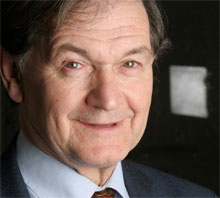
Penrose
Sir Roger Penrose (8 August 1931-) is an English mathematician and physicist whose work on Einstein’s General Theory of Relativity (GTR) played a key role in establishing the centrality of the theory of black holes to modern cosmology. Together with Stephen Hawking, he is the author of the singularity theorems of GTR that established that singularities were generic to the theory rather than artifacts of certain solutions of high symmetry. He is also the creator of twistor theory, involving a generalization of the notion of spinors in quantum mechanics, and the concept of spin-foams, which has played an important role in loop quantum gravity. He has written extensively on the relationship of Godel’s incompleteness theorems and other limitative results in the theory of computations to the nature of the mind, arguing that the kind of cognition involved in mathematical reasoning cannot be the work of a mechanical algorithm, no matter how powerful, and hence that certain reductive strategies in brain science and artificial intelligence cannot be successful.
Since the 1990s he has been a principle advocate of the concept of gravitationally-induced wave-packet collapse, arguing that the measurement problem of quantum mechanics was central to the unification of gravity and quantum theory. He has also argued that new physical principles are required to explain the low-entropy paradox – the fact that, according to Penrose, the universe began in a state of extraordinary low entropy, requiring fine-tuning to an accuracy of one part in 10 to the power 10131. More recently, he has developed a theory of cyclic cosmology, according to which the present universe is only one of a possibly infinite sequence of universes, or eons.
Penrose was born in Colchester, England, and educated at University College, London. He won his doctorate in 1958 on tensor methods in algebraic geometry, which he wrote at St John’s College, Cambridge under the direction of algebraist and geometer John Todd. He was university lecturer at Birkbeck College, London, and at the University of Oxford, where he became Rouse Ball Professor of Mathematics.
Links
Beyond the Doubting of a Shadow: Reply to commentaries on Shadows of the Mind >
Multimedia
In Our Time: The Problem of Measurement >
